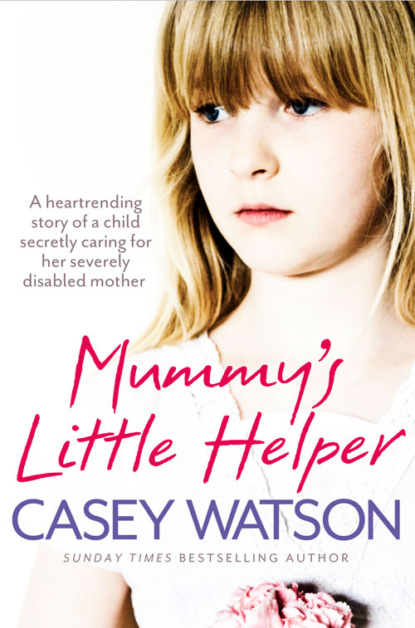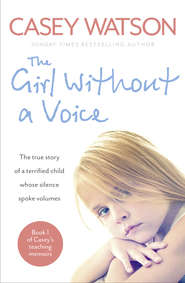По всем вопросам обращайтесь на: info@litportal.ru
(©) 2003-2025.
✖
Mummy’s Little Helper: The heartrending true story of a young girl secretly caring for her severely disabled mother
Настройки чтения
Размер шрифта
Высота строк
Поля
John went on to describe what he’d found at the family home, which was as much of an eye-opener as he’d promised. The whole house, he explained, had been totally modified for a young child to do absolutely everything. There were sticky notes everywhere – some recent, some old and yellowing – on which were hand-written instructions for doing just about everything you could think of. How to operate the washing machine, how to set the timer and the thermostats for the heating and hot water, how to operate the cooker, the microwave and the grill. There were notes on what temperature setting to use for the fridge – summer and winter – and an inventory of the contents of all the drawers and the cupboards, including crockery and cutlery, pots, pans and bakeware, glasses and mugs, housewares and food. The kitchen also contained evidence of just how much routine there was here. There was a big wall chart, detailing what meals would be eaten and when, and a ring binder, chock full of simple recipes, many of which had been painstakingly written out in a child’s handwriting, while others had been torn from magazines.
Abigail also had her own little dedicated cleaning cupboard, where on the inside of the door was written a long list of chores and when to do them: polish wooden furniture and banisters Mondays, bleach in toilet daily, white wash on Thursday, and so on. The house was also liberally strewn with small coloured plastic steps, some of the type you’d use when toilet training a toddler, others larger – including one four-foot stepladder, even – to provide access to high-mounted cupboards.
‘Everything you could think of,’ John finished. ‘Simply everything. Right down to a light-bulb inventory and book of money-off coupons – all in sections – one for each supermarket nearby. If it needs organising, basically, it’s been organised into the ground. Never seen anything quite like it in my life. I suspect there’s not been a minute of a single day that doesn’t – well, didn’t – come with its own list of jobs. Boot camp. That’s the word. It’s just like boot camp. Quite remarkable.’
‘What was the mother thinking?’ I wondered, trying to put myself in her shoes. ‘Why on earth didn’t she get them some help?’
‘Exactly,’ John said. ‘That’s what Bridget and I were both stumped by. I mean, it’s hardly as if help for these sorts of things isn’t publicised, is it? Couple of clicks of a mouse would have her straight to the MS website, wouldn’t it?’
‘So did Bridget talk to her about that?’
‘A little, she says, though none of it was particularly enlightening. She just said they always managed by themselves, pretty much. Which I can sort of see, I suppose. If you’re fairly isolated, anyway. Because it’s obviously happened gradually – as has the progression of the disease, of course. So I suppose I can see how it’s just become their version of “normal”. And Abby will never have known any different, will she? Though, that said, she must surely have seen the way other families work, mustn’t she? When she’s gone to friends’ houses for tea and so on – something must have clicked.’
‘I’m not sure she’s done a great deal of that sort of thing,’ I told him. ‘According to her, she has no friends. Hasn’t got the time for them.’
‘Well, that does ring true,’ he said, ‘given what we’ve seen this morning. Anyway, we might find out a little more about all that later on today. Bridget wasn’t first on the scene, of course – it was the on-duty social worker … So she’s going to chase that up when whoever it was is back in the office later. See if she can find out any more about what’s been discussed. But it’s certainly odd, isn’t it? To cut yourself off from help in that way. Though right now the most pressing thing is to try to find some family. It seems incredible that there’s absolutely no one who could help.’
‘I’ll obviously see what I can find out from Abby, too,’ I said. ‘Maybe she can throw a bit more light on things.’
‘That would be helpful. Anyway, the main thing right now is for you to make sure she’s okay. From what I’ve seen this morning, it’s no wonder she has anxiety-related issues. Her whole life seems to have been one long to-do list, so some emotional fall-out’s going to be expected, isn’t it? She’s going to find the loss of control hard to adjust to, I’m sure.’
John was right, of course. Abby was dropped home from school and the very first thing she did when I opened the front door to her was to go ‘brrr’, and ask me where the central heating controls were. Mindful of my discussion with John earlier I simply took her upstairs and showed her, as she had such a pinched, anxious look on her face, that it was clear this was something that had been on her mind for a while.
‘Can I have a look?’ she asked me, once we were upstairs and peering into the airing cupboard. The controls were set high on the wall, and it was difficult for her to see them. She was a tiny little thing for her age – a good six inches shorter than Spencer, who’d just left us, even though she was a good year older than him.
‘Of course,’ I said, spreading my arms. ‘Shall I pick you up so you can see?’
She seemed to consider for a moment. As I’m sure I would have done, in her shoes. But her need to know soon seemed to triumph over her shyness. She raised her own arms so I could get my hands under her armpits and lift her up.
As soon as the control panel was at eye level I heard – and felt – her sigh. ‘You’ve got this set too late,’ she said, tapping the panel with a finger.
‘Have I?’ I asked her, as I let her back down to the floor. Despite the gravity of the situation, this was such a surreal moment that I struggled to keep the smile off my face.
Her own expression was deadly serious. ‘It’s winter,’ she pointed out. ‘So what I expect you’ve probably done is forget about the clocks having gone back, when you moved in. Did you check it? Because I think it’s set to come on an hour too late.’
I couldn’t help but be impressed by her logic. That and the fact that she’d remembered that we’d not long moved in. ‘Are you cold?’ I asked her, because despite that I wasn’t really sure why it was bothering her anyway. I certainly wasn’t cold. I rarely was. I went at my domestic chores with far too much energy to feel chilly.
Abby shook her head. ‘No, no, not me,’ she explained. ‘I’m at school all day, aren’t I? It’s you. This really needs to come on at around three o’clock.’
There wasn’t much to say to that really, other than that I wasn’t cold, and only tended to put the heating on before teatime if I had my little grandsons round and it was a particularly cold day. Which I did, but as soon as I’d done so, and explained that it was obviously different for her mum – she would feel the cold, of course – she seemed even more agitated than she’d been in the first place.
So when we came back downstairs – after she’d changed out of her uniform, and also changed her dolly – I decided I would just go with the flow. Which I’d clearly need to. As soon as I wondered out loud what we could have for tea, she was once again looking stressed and asking questions.
‘Don’t you know what you’re cooking tonight?’ she asked me. ‘Don’t you have a chart?’
‘No, sweetheart,’ I explained, remembering what John had told me earlier. ‘Not really. I mean, I do have a rough plan – some things to choose from. But I generally see what I’ve got in the fridge and cupboards, then just cook what we most fancy having.’
I was reminded then of Justin, our first foster child. Compared to Abby, his background couldn’t have been more different. A veteran – aged only eleven – of twenty failed placements (foster homes and children’s homes), he’d come to us in such a state of emotional distress and anger that there had been times when Mike and I had despaired of ever being able to even reach him, let alone do anything to help him.
Abby was so different, on so many levels, yet it seemed we had exactly the same issue in the kitchen; that, like Justin, she needed a very clear set of rules – to know, as he had, exactly what we were eating on which day, and when. So, in terms of strategy, perhaps they weren’t going to be so different after all. At least, not in this respect. I smiled at her.
‘But now you’re here,’ I said to her, ‘I’m happy to do things your way – it will be such a treat not to have to think what to cook, I can tell you. So. What would you like for tea?’
This seemed to be exactly the right thing to say because she immediately looked happier, putting a finger to her lips, and tapping them as she consulted the chart she obviously had in her head.
‘Well,’ she said, ‘it’s Wednesday, which is normally scrambled eggs and beans on toast day. If … um … that’s all right with you,’ she added politely.
‘Of course it is,’ I told her. ‘I’ve got plenty of both.’ I was just about to add that she could help me make it if she liked when she rolled up the sleeves of the hoodie she’d changed into. ‘Right,’ she said brightly. ‘I’ll get started, then.’
Of course, one of the things I was aware was in our brief was to gently re-train her to accept that she was a child and, as such, needed to reclaim a childhood. Which obviously meant accepting the normal child–adult roles, which, on the evidence of her first twenty-four hours in our company, was going to be something of a challenge.
But it was early days, so I decided I would let her have a degree of autonomy. For today at least. I told her we would prepare everything and cook it together, ready for when Mike got home from work.
‘And you should have seen her,’ I told Mike, after we’d finished our tea and I had the chance of a quiet few minutes upstairs with him, while Abby sat and wrote in her new scrapbook. ‘There was nothing she couldn’t do. She knew how to crack the eggs, whisk them, open the bean tins, and use the correct bowl for them, work out the microwave – absolutely everything.’
Mike grinned. ‘And it tasted good too! Sounds like we’ve lucked out with this one,’ he joked. ‘A dream, by the sounds of it, certainly compared with young Spencer! More like a housekeeper than a foster child, given half a chance!’
It obviously was a joke, and she certainly wouldn’t be given that half a chance, but even so, I was struggling to see where the challenge in this challenging child lay. Yes, she would have all sorts to deal with in the coming weeks, but compared with the sort of kids we usually looked after, this just didn’t seem to be even on the same scale.
But as later that evening we sat and watched her pulling strands of hair out again, a part of me – the rational part – knew better. She was also, we noticed, clock watching – or watch-watching, more accurately. Checking the little pink watch on her wrist again and again and again; looking at it, tapping the face, then pulling her sleeve back over it, then looking and tapping and covering it again. What she was watching for, what precise timing was being monitored, we didn’t know: when I asked why – if there was something she needed to remember to do – she coloured. Yet she continued to do it, right until the time she went to bed.
No. I knew better. However benign, compared with other kids’, her problems seemed to me, she was with us for a reason, as John had pointed out.
And we’d find out the extent of it soon enough.
Chapter 5 (#ufa41eb4c-5d98-5c52-909f-581fdc2a7e00)
The visit to see Sarah, Abby’s mother, had been arranged for around four the following afternoon and, having seen Abby off to school, I spent much of the day wondering what I was going to find when I met her.
Meeting family members in my role as a foster carer was something I’d learned I could never second-guess. It was such a singular and unnatural situation. In some circumstances, of course, you never got to meet the birth parents of a child you cared for, because all contact had been stopped by social services. Other times the relationship was civil, even if tense. Sometimes a parent was angry and downright hostile – we’d had a baptism of fire in that regard, for sure.
You never knew what to expect. Each situation was different. I’d been sworn at, I’d been threatened, I’d been genuinely scared, often, but the experience that had left the most lasting impression had been a couple of years back, with our second foster-child, Sophia, who had come to us after her mother had fallen down the stairs, and ended up in hospital, in a coma.
Like Sarah, Sophia’s mother had been on her own, with very little in the way of family, which was why Sophia, after a period of being looked after by an uncle, had finally had to come into care. Visits to Sophia’s mother, by the time she had come to live with us, meant visits to a room in a hospice. She was on a life-support system, in a persistent vegetative state, and seeing her for the first time was profoundly shocking. She was so beautiful, and so young, like a sleeping Disney princess. It was an experience I would never forget.
I wasn’t expecting anything quite so dramatic – or, indeed, distressing – today. In fact I was looking forward to meeting Sarah. Most kids are in care because they can’t be left with their families, more often than not because the families in question were unfit, for whatever reason, to care for them.
This was different. Sarah clearly loved her daughter. It was just cruel fate that had conspired against the pair of them. It was frustrating, certainly, that she’d felt unable to ask for help up to now – and the results of her over-reliance on her little girl were obviously a problem – but who was I to say I wouldn’t have done the same in her situation?
And perhaps the illness had crept up on her – multiple sclerosis was like that, wasn’t it? And the situation at home – the way everything had been arranged for Abby to do everything – had obviously grown up over a number of years. And if I knew anything about anything it was that if a situation developed gradually, it could easily become just another version of ‘normal’ – you sometimes didn’t notice it as anything that odd. Perhaps, up till now, Sarah had, to her mind, been coping, and it had taken this crisis to show her she was not.
Much as I looked forward to meeting her, however, I had realised I was woefully ignorant when it came to having a clue about the specifics of her disease.
Mike likewise. ‘Incredible, really,’ he’d commented the night before, once we were in bed. ‘Not to mention lucky.’ He was right. There was no one in the family who’d had multiple sclerosis, and neither of us knew anyone who had either. ‘I think the only person I know of who has had MS is that guy at work – d’you remember?’ said Mike. ‘The one they thought had a drink problem, and almost got sacked? Poor guy. I wonder what happened to him in the end.’
And so it went on. Though, once again, being in the dark was not a new situation for us. When Sophia had come to us with Addison’s disease, we’d had to learn a lot of medical stuff in a very short time just to be sure her illness was kept under control. Were it not, we’d been warned, she could die. This, thankfully, was different. Physically, Abby was just fine. And Sarah wasn’t our responsibility. But we still felt we needed to understand things a little better if we were going to help Abby through this stressful period. At the very least there was the central – and still unanswered – question about what was going to happen with Sarah long term.
In the end, I’d gone downstairs and got the laptop, so we could get a better picture of what we were dealing with. And having familiarised ourselves a little with the mechanics of the condition, we’d spent what turned out to be a dispiriting half-hour, reading about the many ways multiple sclerosis could disable a person. Not the most edifying kind of bedtime reading.











